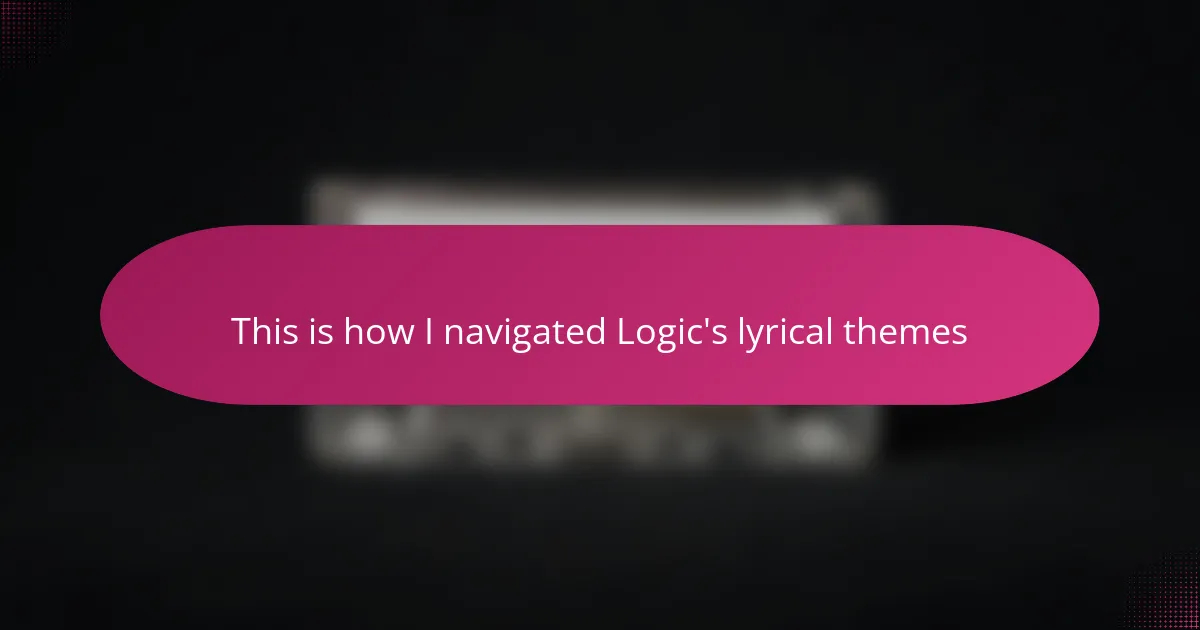Key takeaways
- Rap music themes reveal personal stories of struggle, hope, and identity, making them relatable and impactful.
- Logic’s lyrical style combines intricate wordplay with honest storytelling, often covering themes like mental health and self-acceptance.
- Analyzing rap lyrics involves breaking down verses, understanding narrative techniques, and appreciating emotional delivery.
- Engaging with rap music content can be enhanced by active listening, exploring the artist’s background, and connecting themes to personal experiences.
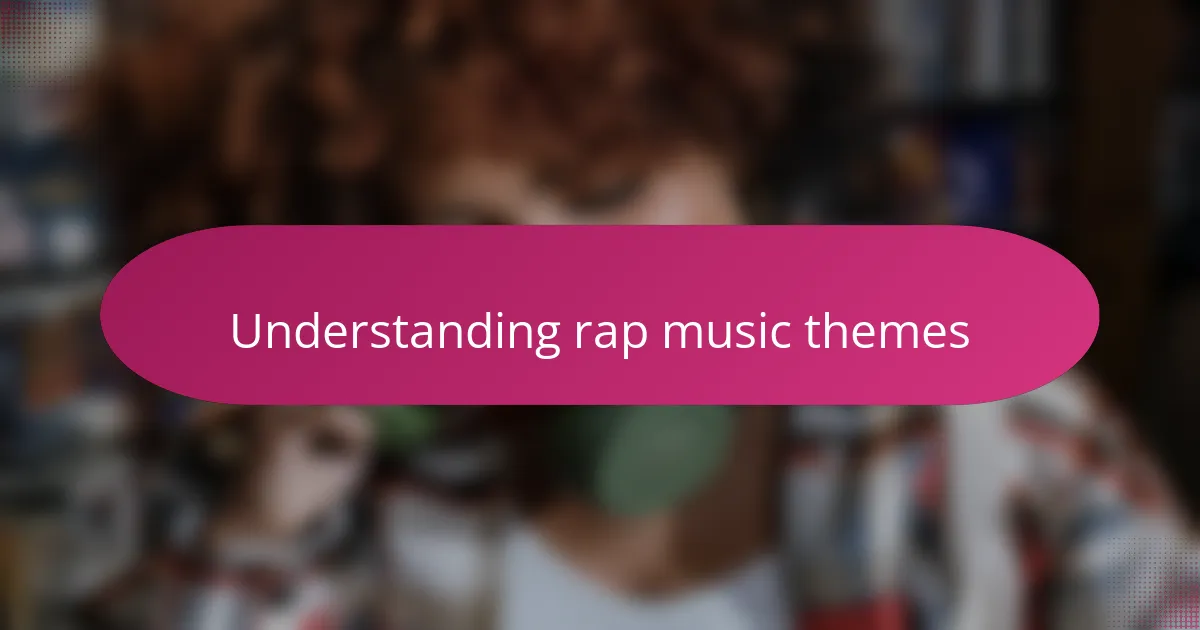
Understanding rap music themes
When I first started diving into rap music, I realized quickly that its themes aren’t just about rhythm or clever wordplay—they’re windows into artists’ lives. Have you ever paused to think about how a single verse can carry stories of struggle, hope, or identity? For me, understanding these layers helped the music resonate on a deeper level.
It’s fascinating how themes in rap can be both intensely personal and widely relatable. I remember listening to tracks where the artist’s vulnerability cut through the beat, making me feel like I was part of their journey. This blend of raw emotion and storytelling is what makes rap themes so powerful and unique.
And beyond the obvious subjects like success or hardship, rap often explores complex issues like mental health, societal pressures, and even philosophical questions. Engaging with these themes felt like uncovering hidden conversations within the music—ones that pushed me to reflect on my own experiences and the world around me.
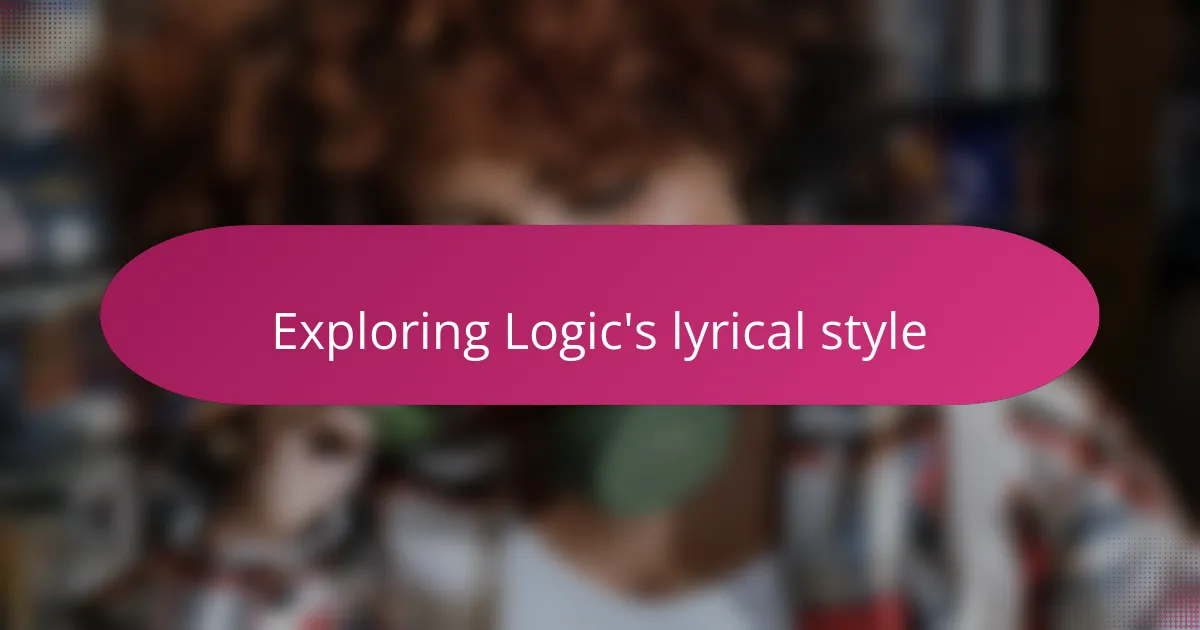
Exploring Logic’s lyrical style
Logic’s lyrical style grabbed my attention because he blends intricate wordplay with deeply honest storytelling. Have you noticed how his verses can shift from rapid-fire rhymes to moments of raw vulnerability? That balance made me realize his lyrics aren’t just clever lines—they’re a reflection of his personal journey.
One thing I appreciate about Logic is how he tackles themes like mental health and identity without sounding preachy. At times, I found myself nodding along, feeling like he was voicing thoughts I struggled to put into words. His sincerity creates an intimate connection, turning his songs into conversations rather than just performances.
What’s interesting is how Logic uses narrative techniques to build vivid emotional landscapes. He doesn’t just tell you what happened; he makes you live it with him. This approach pushed me to listen more actively, searching for layers beneath the surface. Have you ever caught yourself replaying a Logic track, catching new meanings each time? That’s the power of his lyrical style.
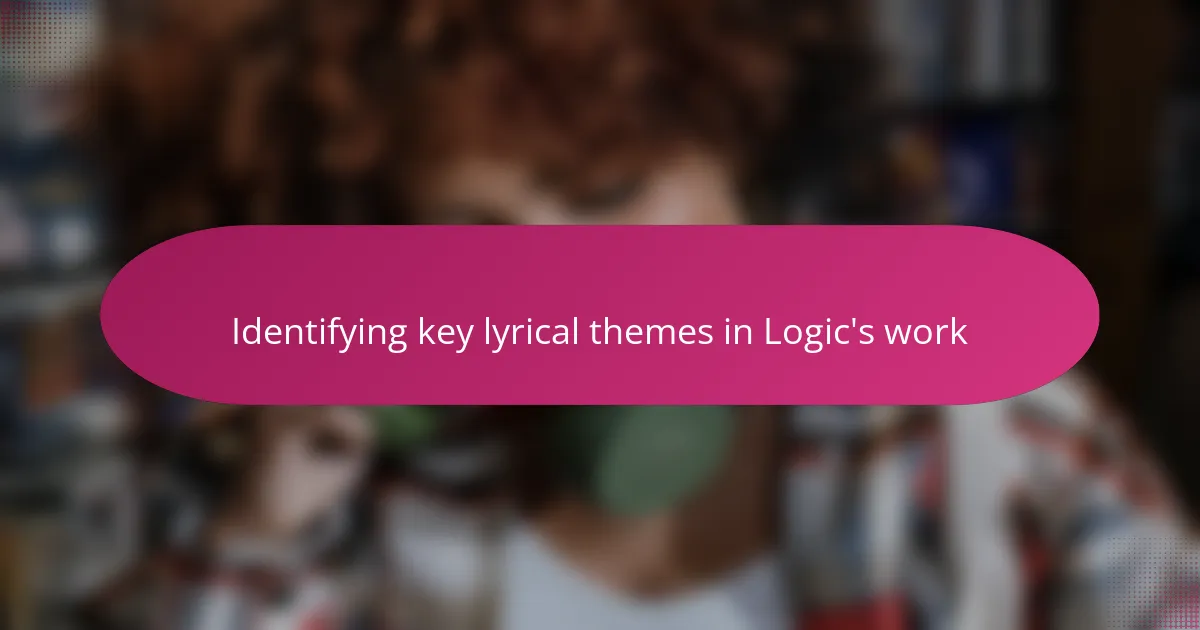
Identifying key lyrical themes in Logic’s work
When I first tried to pinpoint the main themes in Logic’s lyrics, I quickly noticed how often he circles back to mental health. It’s refreshing to hear an artist openly discuss anxiety and depression without sugarcoating, making those struggles feel less isolating. Have you ever heard a verse that made you think, “Wow, someone else gets this”?
Another theme that stands out is identity—especially his reflections on race and self-acceptance. Logic doesn’t shy away from these topics; instead, he dives deep, sharing his internal conflicts and growth. Listening to tracks like these felt like having a heartfelt conversation with a friend who’s figuring things out just like me.
What really struck me was how Logic weaves hope and perseverance through even his darkest songs. There’s this persistent thread of overcoming adversity that kept me motivated during tough times. Did you ever find yourself replaying a track because it lifted you up just when you needed it most? That’s the hallmark of the key lyrical themes I found in his work.
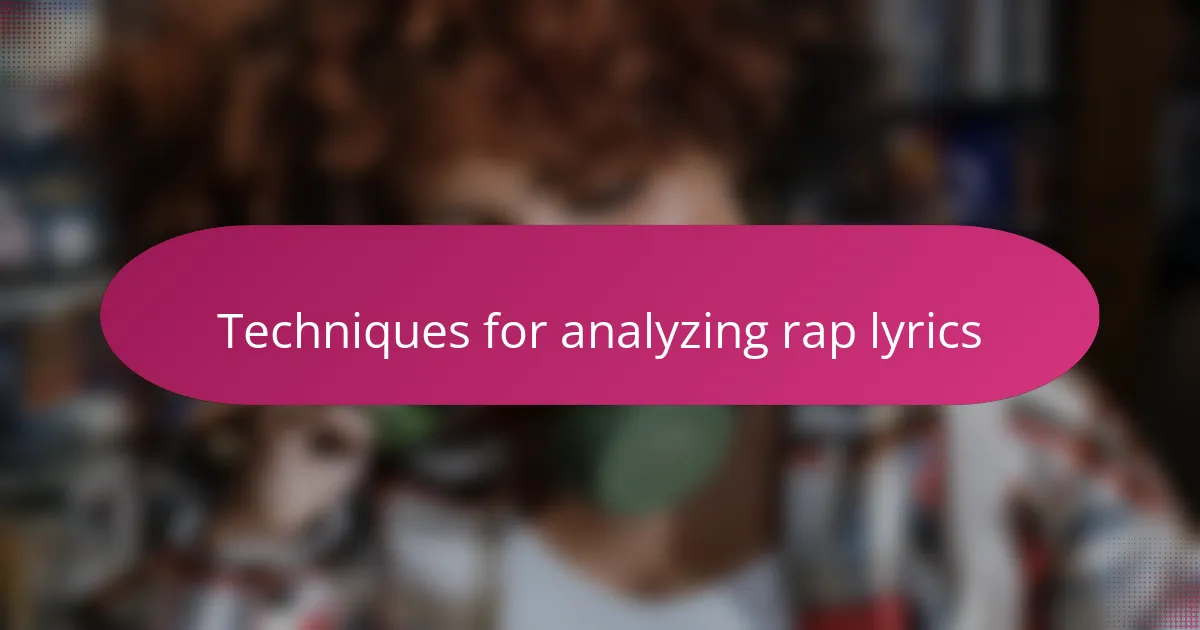
Techniques for analyzing rap lyrics
One technique I found essential when analyzing rap lyrics is breaking down the verses line by line. I remember sitting with a pen and paper, jotting down phrases and looking for recurring words or images. Have you ever caught yourself pausing a track just to dissect a single bar? That moment of focus often reveals hidden layers you might miss on the first listen.
Another approach I lean on is paying close attention to the artist’s use of storytelling and perspective. For example, noticing when the rapper switches from first-person to third-person can signal a shift in emotional tone or theme. This kind of narrative detail helped me connect more deeply with Logic’s work, as I could sense when he was sharing personal insight versus broader social commentary.
Lastly, I often consider the emotional weight behind the flow and delivery, not just the lyrics themselves. Sometimes the passion or vulnerability in the voice tells as much as the words. I vividly recall how Logic’s tone in certain tracks amplified the sense of urgency or despair, making me feel like I was right there with him in those moments. How often do you find yourself moved not just by what’s said, but how it’s said?
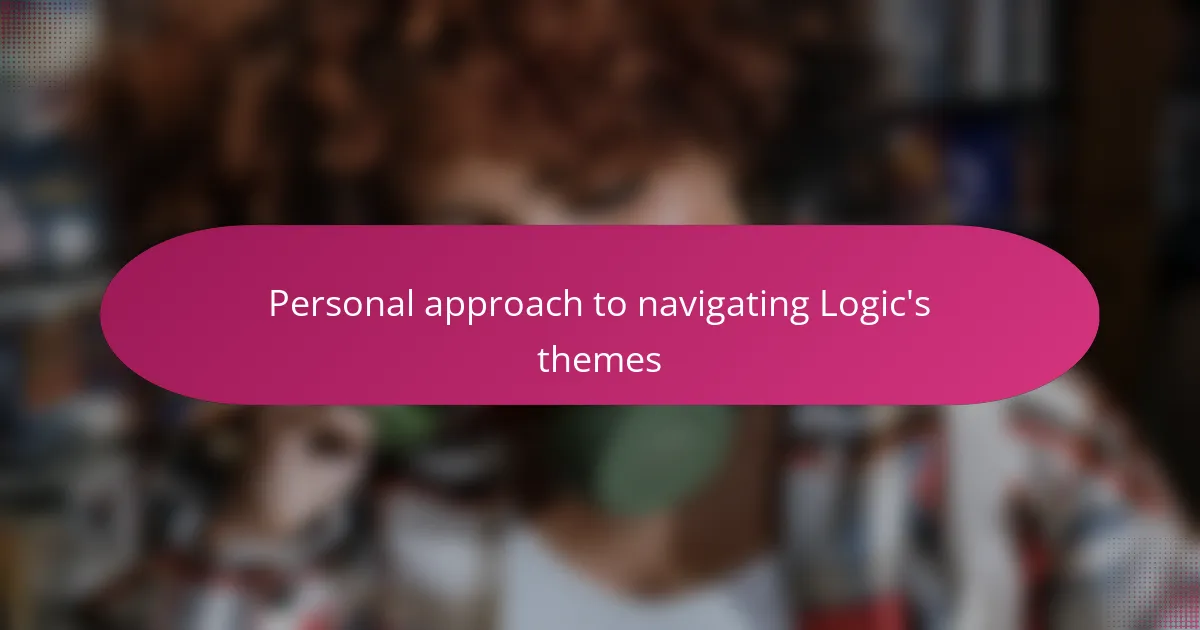
Personal approach to navigating Logic’s themes
For me, navigating Logic’s lyrical themes started with simply letting the music speak to my own experiences. I found myself pausing on certain lines, realizing they mirrored feelings I hadn’t quite put into words. Have you ever had a track hit you so personally that it felt like the artist was inside your head? That’s exactly how Logic’s themes connected with me.
Sometimes, I approach his songs like I’m unpacking a diary—carefully tracing his thoughts on anxiety or identity. It’s a vulnerable space to enter, but it’s also comforting. I remember one afternoon just rewinding a verse about self-doubt again and again, each time discovering a new layer of honesty I hadn’t noticed before.
What really helped was accepting that there’s no single way to interpret his messages. Logic’s themes often feel like conversations—sometimes hopeful, sometimes raw, but always real. Have you found yourself shifting your own take on a song after living with it for a while? That evolving understanding is what made exploring his work so rewarding for me.
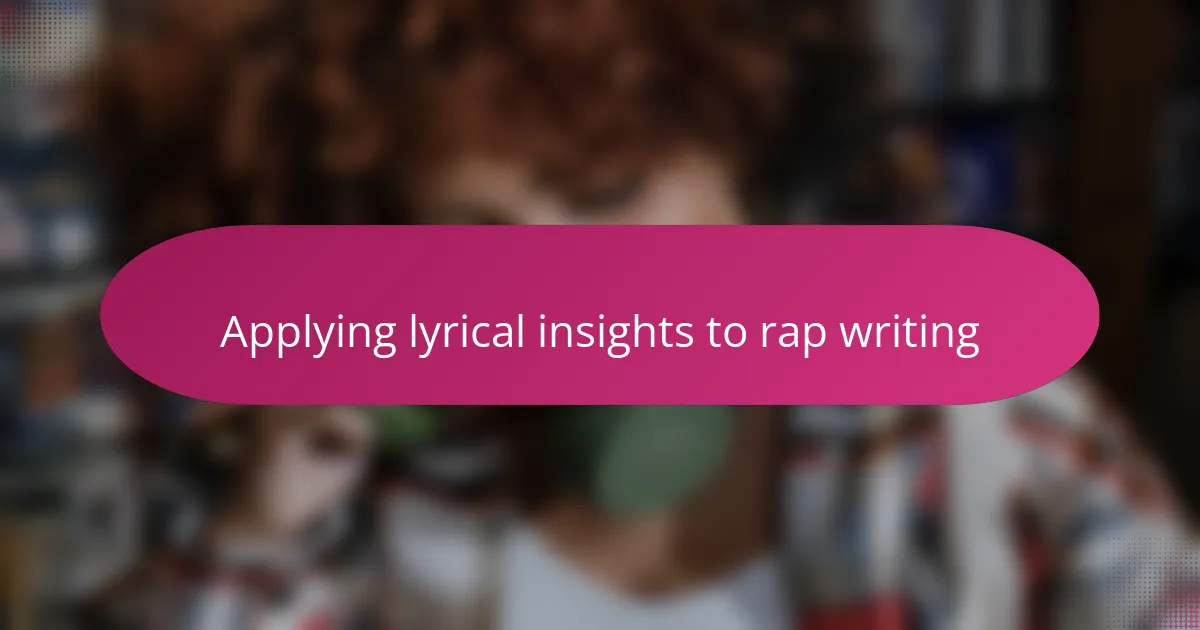
Applying lyrical insights to rap writing
Applying lyrical insights to my own rap writing meant more than just mimicking Logic’s style; it involved tapping into the emotions and stories behind the words. I found that when I focused on the honesty in his lyrics—especially around mental health and identity—it pushed me to be more transparent in my own verses. Have you ever noticed how opening up honestly can transform your writing from a performance into a conversation?
One technique I started using was dissecting his themes line by line, looking beyond the rhyme schemes to the feelings and experiences being shared. That process made me realize how important it is to weave vulnerability into my work, even if it feels uncomfortable. I remember writing a verse about self-doubt after reflecting on Logic’s candidness, and it struck a chord with listeners in ways I hadn’t expected.
Ultimately, applying what I learned from Logic taught me that rap is a powerful tool for connection. When you let your true experiences shape your lyrics, you invite others in. Isn’t that the heart of what meaningful rap should be—stories that resonate not just through sound, but through shared understanding?
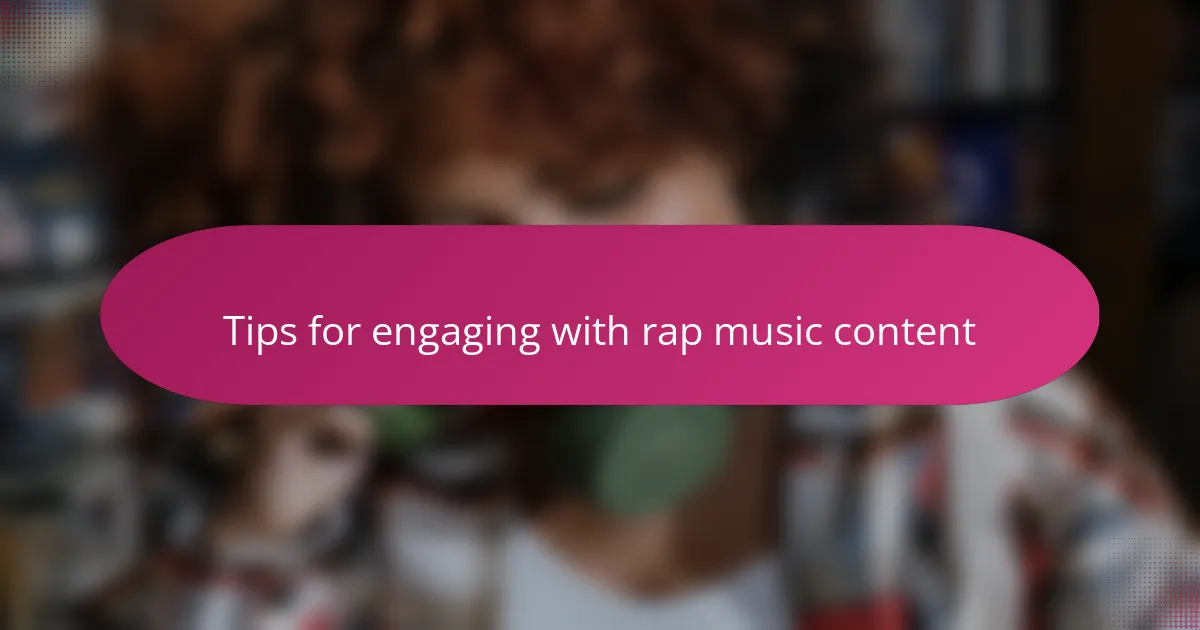
Tips for engaging with rap music content
When I engage with rap music content, I find that active listening is key—really focusing on the lyrics rather than just the beat. Have you ever caught yourself zoning out and suddenly realizing you missed a powerful line? Taking a moment to rewind and absorb those words can turn a simple track into a meaningful experience.
Another tip is to explore the context behind the artist’s message. I like to read interviews or watch documentaries to understand their background and mindset. Knowing what’s happening in their life or the culture they come from adds layers to the music that you might otherwise miss.
Finally, don’t hesitate to connect the themes to your own story. When I relate a rapper’s struggles or hopes to my own, the music hits differently—it feels personal. Have you ever felt like a song was speaking just to you? Embracing that connection makes engaging with rap content not just a listen, but an ongoing conversation.
